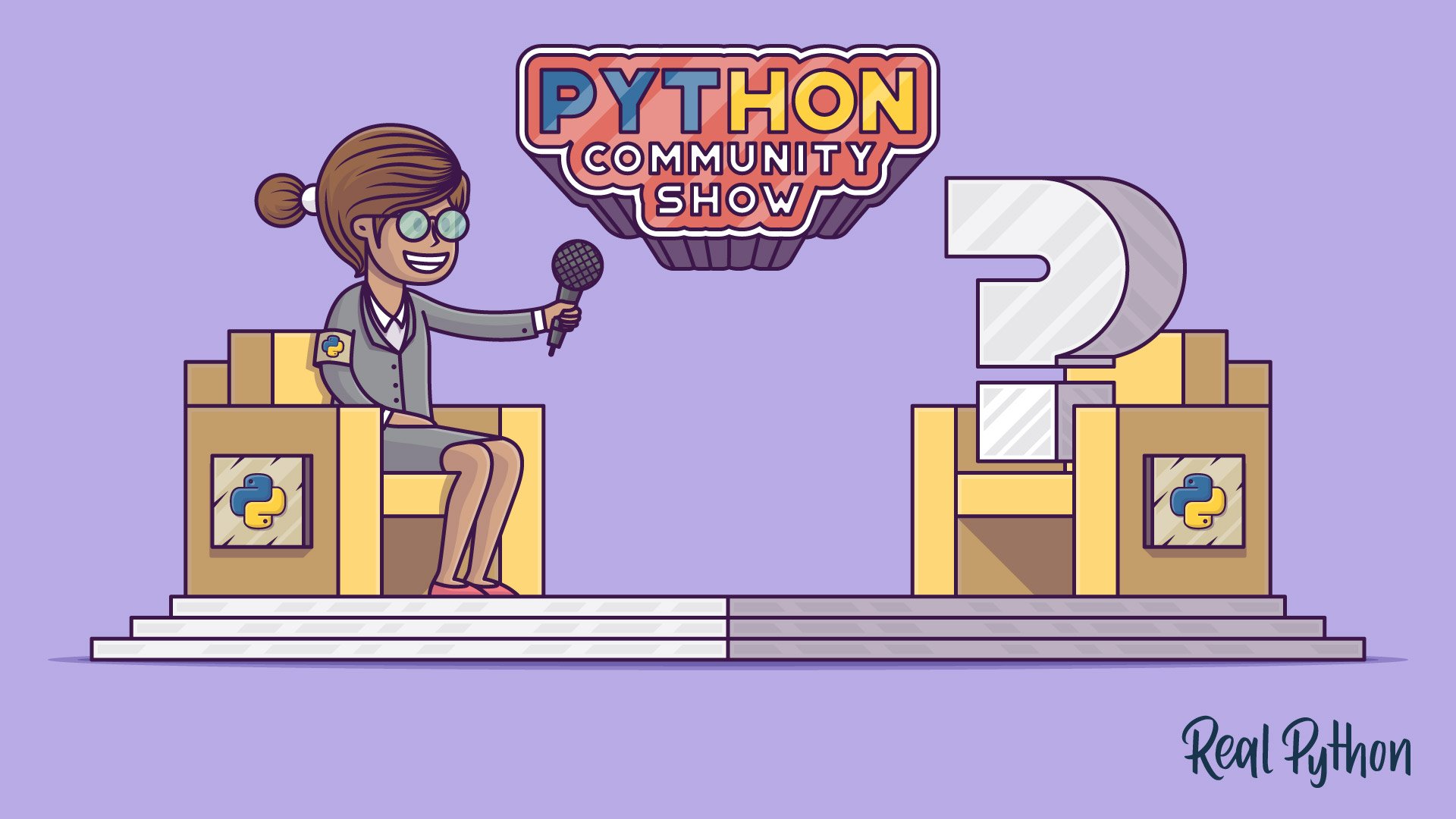Interview conducted in 2018: Some details—such as the guest’s role or references to new developments—may have changed since this conversation took place. If you’re looking for more voices from the Python world, then browse the community topic or use the site search. If you’re looking for fresh conversations, then tune in to the Real Python Podcast.
I’m very pleased to be joined this week by Emily Morehouse.
Emily is one of the newest additions to the CPython core developer team, and the founder and director of engineering of Cuttlesoft. Emily and I talk about the recent CPython core developer sprint and the fact that she completed three majors in college at the same time! We’ll also get into her passion for compilers and abstract syntax trees.
Ricky: Let’s start with the obvious: how did you get into programming, and when did you start using Python?

Emily: My path to programming started with falling in love with Enigma machines. Really, I stumbled into programming during college. I had recently switched one of my majors from Biochemistry to Criminology, and the department had just launched a Computer Criminology program.
I was encouraged to try out the Intro To Programming course to see how I liked it. One of our final projects was building an Enigma machine simulator (in C++, mind you), and I was hooked. I decided to add a third major to take on a full Computer Science degree (more on that later!).
Since the CS program was highly theoretical and focused on languages like C and C++, I started to find ways outside of coursework to learn different things. I picked up Python working on web scrapers on the weekends and was eventually hired as a researcher where we used Python to scrape and analyze public data from various sites.
For me, programming spans this wide range of challenging logic and technical problems to more abstract concepts of how humans think and interact with machines and how technology can enhance our daily lives. It fills a gap between academics and art that I didn’t know I needed to, or could, fill.
Ricky: As you’ve already alluded to, you attended Florida State University, where you completed your CS degree. And a degree in Criminology. And another one in Theater… Did you ever sleep? One degree is hard, but three at once? I’m really curious to know your secrets and any time management hacks for studying and learning to code when you have so much else going on.
Emily: I definitely did not sleep much. On top of all of my schoolwork, I worked a nearly full-time job and even worked as an overnight manager at our local coffee shop while still participating in theater rehearsals and performances.
I was able to get a research position in the CS department to eliminate some of that pressure. I was lucky to have started college with a lot of credits and tested out of a few courses, so I was technically already a year ahead, which gave me more freedom to try out courses like Programming.
It’s all very much how I was raised. From a very young age, I knew that my day started around 7 a.m. I went straight from school to rehearsals and dance classes, then had to do homework until I fell asleep. I had to learn how to retain information and figure things out quickly—and I had to stay organized, so I made a lot of lists.
I’ve asked my parents how I came to be this way, and they just shrug! I’ve always felt very in control of how I spend my time to ensure it’s what I want to be doing, and I think that’s important when staying so busy. You have to want to be doing everything, or else things will fall by the wayside.
I definitely suggest finding a manner of keeping to-do lists and prioritizing your time. I use an app called Bear (like a simplified Evernote, but with programmer-friendly themes and markdown support) along with a lot of task prioritization.
I also figured out that I learn things quickly by writing them down multiple times. I used this method to memorize lines for shows. I’d white-out my lines then go back and physically write them down from memory on a separate piece of paper, rinse, and repeat. I got to the point where if I wrote something down 1 to 2 times, it’d stick.
Ricky: You are the co-founder and director of engineering at Cuttlesoft. It looks as if you started the company before finishing college. What was your motivation for starting your own business instead of applying for junior software developer jobs straight out of college?
Emily: Cuttlesoft was a matter of circumstance. I never imagined I’d run my own company, especially not alongside my now-husband Frank. I was in a weird timing limbo where I’d finished my undergraduate degrees earlier than expected which meant that I missed all of the grad school deadlines.
FSU agreed to let me jump in and start my Masters there, and my intention was to stay for a year then transfer elsewhere where I could continue working with parsers, compilers, and formal verification. I was also getting recruited by huge tech companies, and I was a bit enamored with the idea of living in San Francisco or Boston. (I’d only ever lived in Florida at the time.)
But then Frank and I had found our way into this budding entrepreneurship ecosystem in Tallahassee. We met a few people who became great mentors, and before we could even get our Is dotted, we had our first couple of clients. I thought, “Why do I want to leave all of these people who are invested in my future and success to go be one of the thousands somewhere else?”
I figured that I should take the chance on starting something of my own and continuing on this rapid growth path. I knew I’d learn a lot more in a shorter amount of time than I would almost anywhere else. So I dropped out of graduate school after my first semester and put all of my time into Cuttlesoft.
Looking back, I can’t imagine a different path for me. Soon after I turned down those job offers, Susan Fowler’s story came to light. I couldn’t help but think, “That could have been me.” I truly believe that a company’s culture is top-down, and I’m grateful to get to contribute to a company where I can make a huge impact in a positive manner.
Ricky: This year, you got to fulfill a dream and speak at PyCon, with your talk titled The AST and Me. I’ll admit, some of it went over my head, but I’m still learning. I got the impression that language internals fascinate you. What advice would you give to someone who is at the start of their coding journey and wants to know more about how the sausage is made? What resources would you recommend?
Emily: Yes! I was the weird kid in university who loved the classes that most everyone else hated (Programming Languages, Compilers, Theory of Computation…). I would spend hours drawing out non-deterministic finite automata and state machines for my course notes.
I’m a huge fan of Seven Languages in Seven Weeks: A Pragmatic Guide to Learning Programming Languages by Bruce A. Tate to get a feel for different programming language paradigms. The Dragon Book (Compilers: Principles, Techniques, and Tools) is a classic and is the backbone of so much we still use today. (Python’s compiler is based on this.) Philip Guo’s video series on CPython internals is also awesome and helped me in my journey diving into how Python works under the hood.
Ricky: Huge congratulations are in order, as you have just been promoted to a CPython core developer! You must be so thrilled. How was the initiation at the recent CPython sprints? Anything exciting to share or any stories to tell? Don’t worry, we can keep a secret…
Emily: Thank you! The CPython Sprint was a lot of fun. It’s rare that we get so many core developers in the same room working together. We’re all incredibly grateful for the PSF and this year’s sprint sponsor, Microsoft, for supporting CPython.
I was able to attend sprints and Language Summits at PyCons past and had the chance to get to know a lot of the group previously, so this sprint felt surprisingly normal, but it was super cool to see and work with everyone in person.
I spent most of the sprint implementing PEP 572, the (in)famous assignment expressions PEP, with Guido’s guidance. No matter which side of the fence you fell on with assignment expressions (or I as lovingly now call it, the walrus operator), it’s been incredibly cool to add new syntax to the language and deep dive into the internals to get variable scoping to work as intended. It will be in the alpha versions of 3.8 early next year, so keep an eye out!
One of my favorite parts of the sprint was getting to know more about the history of CPython. Since the beginning of my path in core development, I’ve found that it’s really interesting to hear the stories of how others became core developers, so I pose that question to everyone I can.
Understanding everyone’s journey and motivations for devoting so much of their time and energy to a project (especially those who have been involved since the very early days) is an important step to understanding how to continue growing the group and increasing diversity.
Ricky: Now for my last question: what other hobbies and interests do you have, aside from Python? Any you’d like to share and/or plug?
Emily: I try to take advantage of everything Colorado has to offer in my spare time—coming from Florida, I’m still totally enamored with the Rocky Mountains and love hiking. Denver is also a great foodie city.
When I make the time for it, I also really enjoy yoga, reading, listening to podcasts, playing video games (though I’m still slowly working through the most recent God of War), and trying to keep my houseplants alive. I also enjoy spending time with my husband and our dog—they’re my world.
Thank you, Emily, for joining me this week. You can follow Emily’s work on Twitter or Github. Find out more about her company, Cuttlesoft, here.
If there’s someone you’d like me to interview in the future, reach out to me in the comments below, or send me a message on Twitter.


